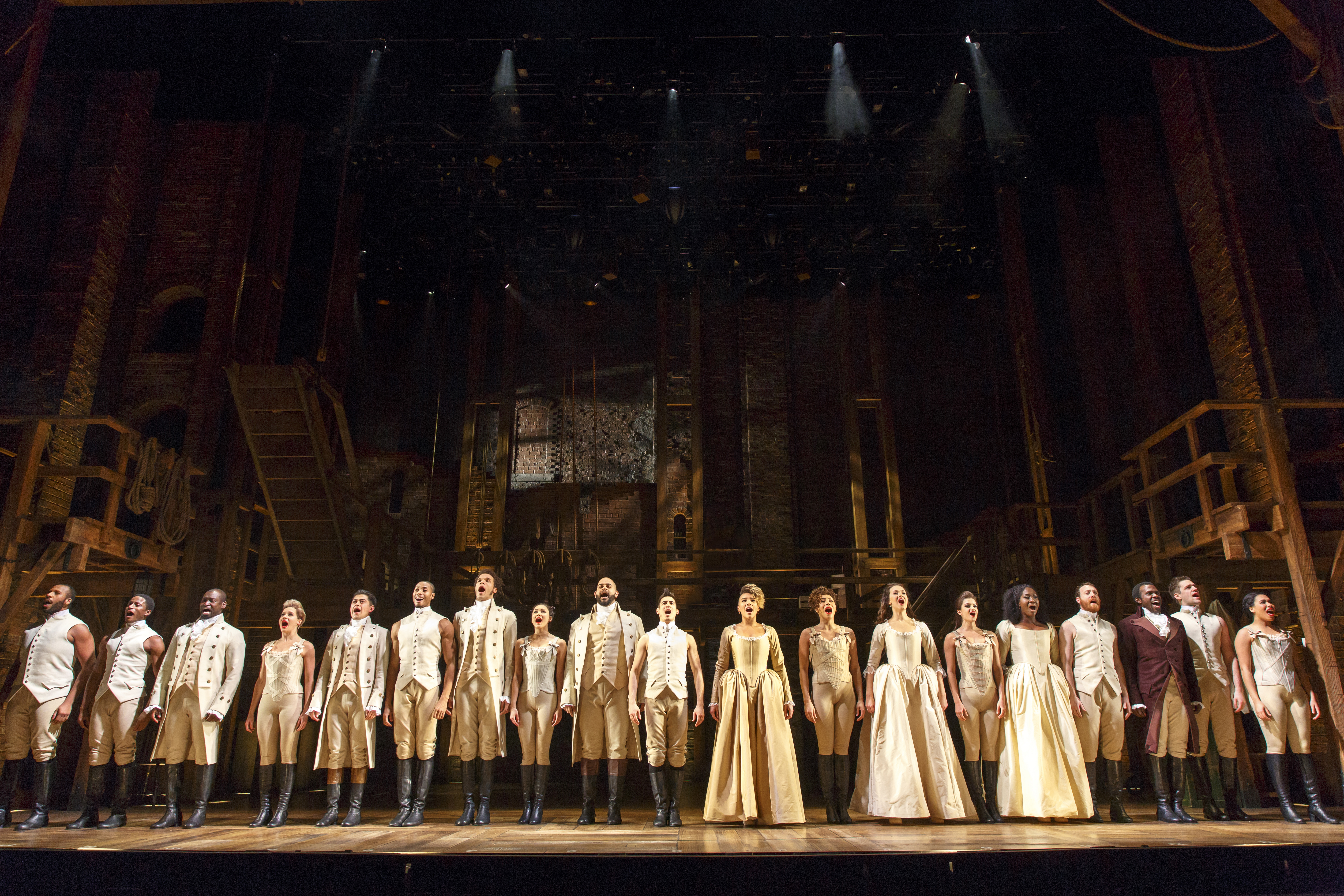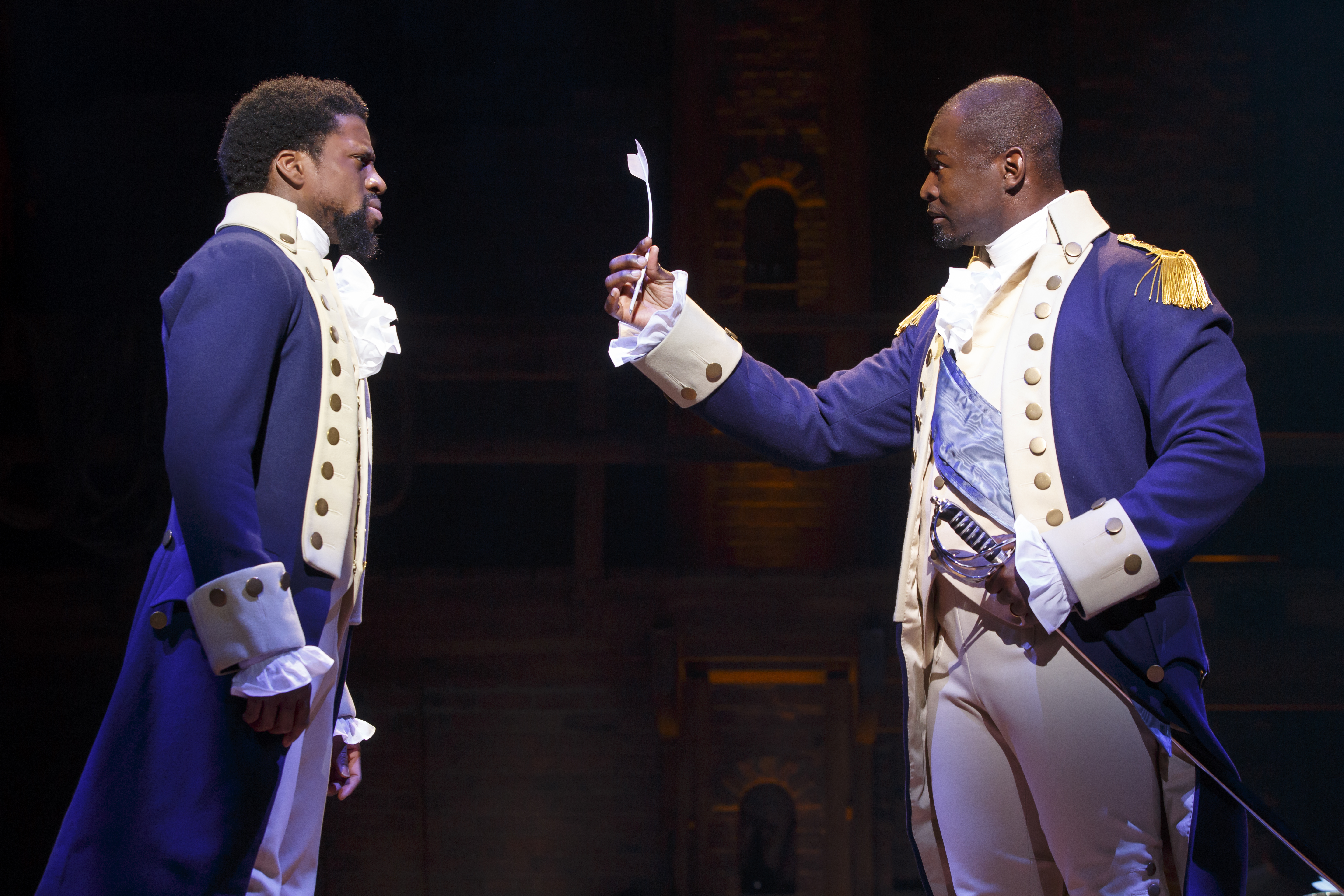Known as the epitome of bringing history into the 21st century, the Tony-winning Broadway musical "Hamilton" has inspired ASU professors to approach their curriculum with contemporary storytelling and a focus on diverse perspectives.
"Hamilton" is the theatrical embodiment of the idea of historically underrepresented groups finding a voice through unconventional outlets. The groundbreaking show about the Founding Fathers, which has taken the world by storm, has a run at ASU Gammage from Jan. 30 to Feb. 25.
Next semester, ASU professors across several disciplines will teach classes with different emphases related to music and theater history, the country’s founding and race, with curriculum centered around "Hamilton."
The World of Alexander Hamilton
Pamela Stewart, senior lecturer of history for the College of Integrative Sciences and Arts, has been building her course “The World of Alexander Hamilton” for about a year — since she found out the musical was coming to ASU.
“I just saw what (the musical) was doing for young people who were seeing it, many of whom I’m sure at some point or another had been turned off to history or believed it wasn’t about them,” Stewart said. “I just saw a wonderful opportunity to really sort of mix the past with the present.”
She will teach the history of Alexander Hamilton using documents written by the Founding Father himself, ranging from love letters to the Federalist Papers. Students will make connections between Hamilton’s life and the musical, creating their own raps to reflect on their learning.
“('Hamilton') says a lot about who we are and what are some of the things we’re wrestling with today, but it evokes so much of history and also factual history, that I think it allows for a bit of spark and motivation that not everyone gets when they think of textbooks and memorizing names and dates, that too many associate with history,” Stewart said.
They will also read "Hamilton: The Revolution," co-written by Jeremy McCarter and Lin-Manuel Miranda, who also wrote the book, music and lyrics for "Hamilton" and starred in its original cast. The book explores the background, music and making of the musical.
By looking at history from the margins to the center, Stewart hopes her students will still see the centers of power, but with a much wider lens.
“I hope it’s something when they look back they can say, ‘Wow, I got to see Hamilton,'" she said. "I think that’s going to be something that’s going to continue to pay off down the road in ways that we really have no way of comprehending at this time.”
Race and Performance
A second class, with a focus on race and performance, will be taught by Mathew Sandoval, faculty fellow at Barrett, The Honors College.
“It’s not just a music class. It’s not just a history class. It’s a way of dealing with race. And 'Hamilton' does deal with that. Not just in its casting but the topic of the show, really,” Sandoval said.
His students will attend several productions from ASU Gammage’s diverse and eclectic Beyond Series, as well as "Hamilton." He hopes to inspire them to engage with their cultural surroundings and grow an appreciation for the arts.
The Downtown Phoenix campus course will be open to Barrett, The Honors College students from a variety of majors, allowing for a plethora of perspectives to be represented in class discussions.
“The show is literally an interrogation of the fabric of America. Whether it's tearing apart, whether we’re re-creating it, whether we’re sewing it together — like how we deal with the fabric of America,” he said, adding that hip-hop music and its wider culture have been sparking conversations about race in America for many years already, making "Hamilton" the perfect pairing for this class.
While Sandoval knows that his students are engaged in the current political climate and likely discuss these issues with family and friends, he believes it will be helpful to have respectful conversations with other students in a classroom dialogue, allowing for other points of view to be represented.
“The race component of the class is going to be big because it's one thing to talk about race in terms of history, or a sociological or cultural study, but it's another thing to talk about race in performance,” he said. “In some ways, it's like an easier entry point to have more difficult discussions about race.”
Although unsure whether "Hamilton" will return to ASU Gammage in the coming years, Sandoval said he wants to continue his course with the other rich performances presented at the university.
“Not everybody knows this, but ASU Gammage is one of the most well-respected and largest programmers and arts presenters in the Western United States. We have a gem in the desert here that doesn’t get taken advantage of,” Sandoval said. “You know, not every student who's at a university gets a chance to see 'Hamilton,' or see Kristina Wong, or see Dance Theatre of Harlem, or see any number of the things that ASU Gammage is presenting here.”
The touring cast of Broadway smash "Hamilton" will play ASU Gammage from Jan. 30 to Feb. 25. Photo by Joan Marcus
'Hamilton,' Hip-Hop and Musical Theater
Chris Wells, assistant professor of musicology for the Herberger Institute for Design and the Arts’ School of Music, will teach two Hamilton-based courses grounded in music history.
“I’ll speak to the deep importance and impact of the show, and the stakes of political battles and political discourse when it enters the realm of entertainment and stages,” Wells said, explaining his fascination with the intersections of music and politics.
The courses will explore the history and influences of hip-hop and traditional musical theater on Miranda’s work, and they will involve music analysis.
"Popular Music—Hamilton" will be available to general students, and "Hamilton, Hip-Hop and Musical Theater" will be limited to upper-level and graduate students in the School of Music.
He said hip-hop enthusiasts in his class will use their knowledge to make strong connections to the show while gaining a footing in musical theater history, and those with more of a musical theater background will learn to better understand the hip-hop genre and culture.
“It’s also very much in the spirit of the show itself and the kinds of educational programming and audience outreach that Miranda has expressed is very important to him and very much at the core of the show,” Wells said. “I know he’s very invested in 'Hamilton' being about access both in terms of the performers who are on the stage and the stories and genres of music that are represented, but also who is able to see the show, who is able to connect with this piece of work in a deep and meaningful way.”
Wells' classes aren’t just about getting the hot ticket in town; they’re about experiencing live theater in a deep and meaningful way.
“I want to help students understand that the many ways in which art is and can be political is precisely at the core of why I think 'Hamilton' is important and is an important thing to talk about,” Wells said.
Michael Luwoye (left) and Isaiah Johnson play Alexander Hamilton and George Washington in "Hamilton." Photo by Joan Marcus
Touchdown in the theater
Classes aren’t the only way ASU students can interact with "Hamilton" next semester.
As part of the third annual Senior Championship Life Experience, Sun Devil Athletics will bring an estimated 200 graduating student-athletes, senior administration and coaching staff to watch the musical at ASU Gammage.
Buffie Anderson, who supports Sun Devil Athletics’ outreach programs, helped create the Senior Championship Life Experience with her husband Ray, vice president for university athletics.
“The purpose was to teach leadership, how to make tough decisions and how to deal with the consequences,” she said.
Years ago, when the Andersons worked for the NFL, Ray traveled to the historical Gettysburg Battlefield in Pennsylvania as part of a senior staff trip organized by Arthur Blank of the Atlanta Falcons. The experience was so impactful, they decided to continue with a similar tradition at ASU, with support from Colleen Jennings-Roggensack, executive director of ASU Gammage and ASU vice president for cultural affairs.
“This is now the third year Buffie and I are fortunate to help bring an impactful, educational and invigorating experience to our graduating student-athletes, senior administration and coaching staff,” Ray said. “'Hamilton' is obviously a world-renowned production with 11 Tony Awards and a Pulitzer Prize, so this is sure to be a remarkable experience for our seniors and staff, and one we hope will have an everlasting impact.”
In 2016, the Sun Devil Athletics team brought “Black Angels Over Tuskeegee” to ASU’s Galvin Playhouse for the first senior experience. This past spring, they screened the documentary produced by USA Swimming, “The Last Gold.”
This year is expected to be their largest program yet.
Buffie said some people don’t understand "Hamilton's" power. Athletes can learn lessons of leadership from the Founding Fathers — not only through their actions in war, but in empowering the population to have a voice.
“I think it’s so powerful to be able to give the opportunity to students who may or may not have ever stepped in the theater,” she said. “What it gives them is a limitless opportunity to understand our U.S. history, our Founding Fathers. It’s just amazing what theater can do for everyone.”
Top photo by Joan Marcus
More Law, journalism and politics

When police moonlight, who’s watching?
When police officers work off-duty security jobs, or “moonlight,” often in uniform and sometimes with full police powers, the lines between public service and private interest can blur.A new…

Arizona tax changes this year: What to know
Let’s face it: Tax season is rarely anyone’s favorite time of year. And this time around, there’s an added wrinkle as Arizona’s tax code is in flux.Arizona lawmakers are debating which of the recent…

ASU course inspires students from different majors to engage with government
On a brisk January morning, about 50 students file into a classroom on Arizona State University's Downtown Phoenix campus. Many of the students are majoring in journalism or nursing but they are…









